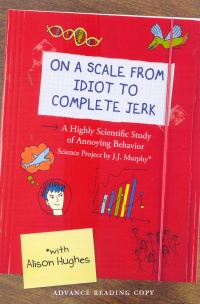| ________________
CM . . .
. Volume XX Number 20. . . .January 24, 2014
excerpt:
J.J. Murphy is an eighth grader who has undertaken a study of jerks for his school science project. Murphy argues that jerks have existed throughout human history. He describes the first “documented” caveman jerk and dissects popular folktales, stories, and songs to illustrate the prevalence of jerks both historically and culturally. Murphy claims that no formal scientific study has been undertaken to study this widespread phenomenon, and, therefore, in this book he asks a series of research questions, explored through case studies, such as, “Can young children be jerks?” Author Alison Hughes has crafted an authentic and endearing narrator – J.J. Murphy is the kind of boy most readers would like to be friends with. Expository writing is generally meant to inform rather than entertain, and so Hughes has her work cut out creating an engaging tale without the benefit of a suspenseful plot, an overarching story arc, or character development. Instead the author relies on wit alone to captivate the reader. This is done well for the most part; however, one criticism is that our dear narrator J.J. Murphy tends to run on a bit. Various sections of the book could have been much more concise – in fact, by cutting down the text, the most humorous sections would be foregrounded and overall more entertaining. However Hughes is a skilled writer, words roll off the page, and most readers will keep turning the pages. The “case studies” of various jerks – young jerks, old jerks, sports jerks, etc– are illustrated with amusing stories and observations. The case study format allows the utilization of many elements of a school report with which readers may be familiar or may be introduced to for the first time: subjects, experiment, observations, conclusions. The organization of the book also scaffolds reluctant readers with the predictable chapter format and makes it easy to read the book in short doses. Unfortunately, the cover design will not impress readers as it is garish and looks a bit out of date – luckily the same style of illustrations works very well in black and white in the interior of the book. The charts, tables, and graphs within the book are likely to get the biggest laughs from readers. One notable example is “Scientific Illustration #8: Rating Annoying Teacher Behavior.” Teacher behavior such as, “making the entire class stay after school because one kid threw a snowball” is rated, in this case 6-7 on the jerk scale because according to Murphy: “One kid. One snowball. Do the math.” (p. 86) In sum, this is a witty and skillful account of those ‘idiots’ and ‘jerks’ that populate the lives of children. According to J.J. Murphy, “scientific studies such as this one can take us beyond gut reactions and help us identify, classify, understand and avoid jerkish behavior” (p. 130). By cleverly making light of those who bully, tease, taunt, trick, bother, annoy, or act unfairly, Hughes entertains young readers and reminds them this is just all part of life – after all, “as long as there are humans on this planet, some of them will be jerks.” (p. 130) Recommended. Alicia Copp Mökkönen, an educator, librarian and researcher, currently lives in Vancouver, BC.
To comment
on this title or this review, send mail to cm@umanitoba.ca.
Copyright © the Manitoba Library Association. Reproduction for personal
use is permitted only if this copyright notice is maintained. Any
other reproduction is prohibited without permission.
NEXT REVIEW |
TABLE OF CONTENTS FOR THIS ISSUE
- January 24, 2014.
AUTHORS |
TITLES |
MEDIA REVIEWS |
PROFILES |
BACK ISSUES |
SEARCH |
CMARCHIVE |
HOME |
